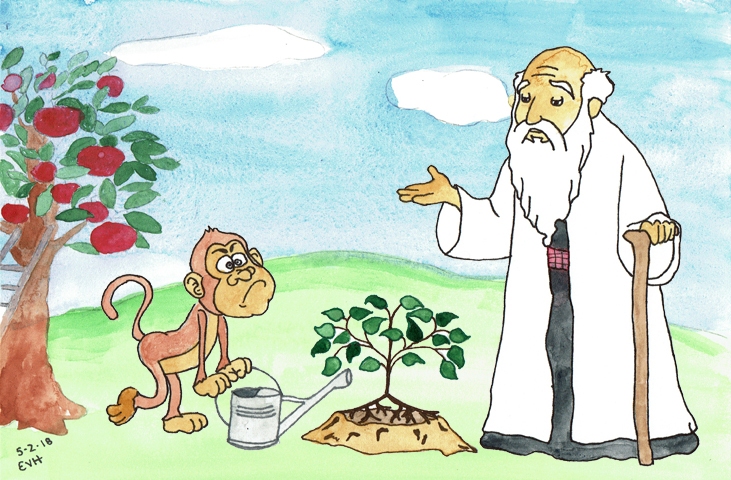
Jataka 46
Ārāmadūsaka Jātaka
The Garden Spoiler
as told by Eric Van Horn
originally translated by Robert Chalmers, B.A., of Oriel College, Oxford University
originally edited by Professor Edward Byles Cowell, Cambridge University
The theme of this story is something akin to “the road to hell is paved with good intentions.” We do a great deal of harm because of a lack of wisdom, like giving money to an alcoholic who just runs straight to the liquor store.
The Buddha’s path is not “good intentions,” it is wise and skillful intentions. If we act from our emotions rather than from intelligence and wisdom, we can do a great deal of harm.
“It is knowledge.” The Master told this story in a certain village of Kosala. It is about someone who spoiled a pleasure garden.
Tradition says that, in the course of an alms journey among the people of Kosala, the Master came to a certain village. A wealthy landowner invited the Buddha to eat the midday meal at his house. He had his guest seated in the pleasure garden. There he showed hospitality to the Saṇgha with the Buddha at its head, and he courteously gave them permission to stroll about the grounds. So the monks rose up and walked about the grounds with the gardener. Observing a bare space in their walk, they said to the gardener, “Lay disciple, there is abundant shade everywhere else in the pleasure garden, but here there is neither tree nor shrub. Why is that?”
“Sirs,” the man replied, “when these grounds were being laid out, a village lad, who was doing the watering, pulled up all the young trees and then gave them too much or too little water according to the size of their roots. So the young trees withered and died, and that is why this space is bare.”
Going back to the Master, the monks told him this. “Yes, monks,” he said, “this is not the first time that village lad has spoiled a pleasure garden. He did the same thing in bygone times as well.” And so saying, he told this story of the past.
Once upon a time when Brahmadatta was the King of Benares, a festival was proclaimed in the city. At the first summoning notes of the festival drum, the towns people poured out to keep holiday.
Now in those days, a tribe of monkeys was living in the King’s pleasure garden. The King’s gardener thought to himself, “They are having a holiday in the city. I’ll get the monkeys to do the watering for me and go off to enjoy myself with everyone else.” So saying, he went to the king of the monkeys. He discussed how much they benefited from living in the pleasure garden because of the flowers and fruit and young shoots to eat. He ended by saying, “Today there is a holiday in the city, and I’m going off to enjoy it myself. Couldn’t you water the young trees while I’m away?”
“Oh! yes,” said the monkey.
“Only mind that you do,” said the gardener; and off he went, giving the monkeys water skins and wooden watering pots to do the work.
The monkeys took the water skins and watering pots and started to water the young trees. “But we must be careful not to waste the water,” observed their monkey king. As you water, first pull each young tree up and look at the size of its roots. Then give plenty of water to those whose roots are deep, but only give a little to those with tiny roots. When this water is all gone, it will be difficult to get more.”
“We will,” said the other monkeys, and they did as he had instructed them.
At this point a certain wise man, seeing what the monkeys were doing, asked why they pulled up tree after tree and watered them according to the size of their roots.
“Because this was our King’s command,” the monkeys answered.

Figure: “The Foolish Monkey”
Their reply moved the wise man to consider how, with every desire to do good, the ignorant and foolish only succeed in doing harm. And he recited this stanza:
It is knowledge that crowns effort with success,
For fools are thwarted by their foolishness,
— Witness the ape that killed the garden trees.
With this rebuke to the king of the monkeys, the wise man departed from the pleasure garden with his followers.
The Master said, “This is not the first time, monks, that this village lad has spoiled a pleasure garden. He did the same thing in bygone times as well.” His lesson ended, he showed the connection and identified the birth by saying, “The village lad who spoiled this pleasure garden was the king of the monkeys in those days, and I was the wise and good man.”
